Black metal and death metal legend Quorthon of Bathory took some time to answer our questions while he was busy recording the Nordland series of albums. Among all the interviews we’ve done, this may be the most focused and articulate, with one of the most passionately intelligent figures black metal has ever produced.
The dominant influences on the earlier Bathory work appear to be Venom and Slayer. Were you listening to other music at the time, including hardcore punk like Discharge?
I think it is very easy for people to be making that kind of connotation, simply because those two acts in particular are perhaps among the first ones that comes to mind when the roots of extreme metal is being discussed. But actually, I have never owned a Venom or Slayer album. And I don’t give a fuck if people believe that or not.
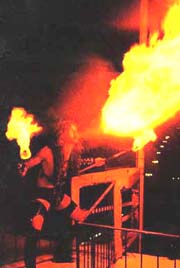
I know some people believe the change of style for BATHORY, in terms of the music and lyrics around 1988-1990, happened because we must have got turned on from Manowar. That’s another total misconception. I have never owned a Manowar record. And I don’t give a fuck if people believe that either. Not that it matters though.
I have of course heard Slayer (an act, which by the way does have all my respect for being original and for sticking to their roots in much of what they do). And I have heard a handful of tracks by Venom.
In 1986-1988, BATHORY had a drummer who was heavily influenced by Manowar. He didn’t enjoy any other type of metal, but he was somehow sold on Manowar. It wasn’t like we decided to copy what they were doing. However, the typical heavy Manowar beat seemed to perfectly suit my new ideas for lyrics at the time. The way it came about was this; in an effort to get away from the whole “are they true satanists or not”-discussions that went on in the media at the time (sort of drawing the attention away from what was truly important, the music), I felt I wanted to replace the whole demonic & satanic bag with something that was pure from christian and satanic bullshit.
The pre-christian Scandinavian Viking and vendel era seemed perfect for lyrics and arrangements. Had BATHORY been a japanese act, we might as well have picked up the Samurai culture. Had we been an Italian act, it could easily have been the Roman empire era. Now, we happened to be a Swedish act and the Viking and Vendel era seemed exciting in terms of writing music and lyrics. The heavy Manowar beat that this one-time BATHORY drummer came up with one day in the rehearsal place, is a Manowar contribution. But I wonder if that’s enough to be called a source of inspiration or influence.
My personal reason for forming BATHORY was I wanted to create a mix of the atmosphere of early Black Sabbath, the energy of early Motörhead and the pace of early GBH. We were just three shit kids coming out of school at the time, with absolutely no knowledge at all about any other acts. Remember, Metallica released their first album around the time we entered the studio for the first time. Slayer too released their first album at the same time. We were totally in the dark about any underground movement in Europe. It wasn’t until way after we had already released our first album that we learned about tons of others acts in Europe and elsewhere playing basically the same type of primitive and dark extreme metal that we were making.
Around the time I formed BATHORY, I was listening a lot to an album by early GBH I believe was called “City baby in attack of the rats”. We based half of BATHORY’s initial sound and style on that GBH album. I may have listened to some Discharge, but I don’t remember any of their songs or any of their titles anymore. The “Ace of Spades” and “Iron Fist” Motörhead albums also meant very much when we formed BATHORY. So did the first handful of Black Sabbath albums.
Bathory has always stood above other bands by having a melody connected firmly to a rhythm in the anthemic style of most great metal bands. How did you learn to play guitar, and what methods do you have for conceptualizing the songwriting process?
I don’t think I worry too much about whether to include a melody line or not in a song. That will come along in a natural fashion. I have always said that a song and a lyric writes itself. I really don’t think too much about the actual writing, the arrangements or even the playing. It’s second nature by now.
I don’t know if having a melody line in a song would place BATHORY “above” other bands, but sure it does add something special to a song. Extreme noise and brutalities are always fun to do. But if you’re trying to tell the audience a story, which we do a lot in BATHORY, I think a melody line will add atmosphere and personality to the story.
I don’t see myself as a guitar player. I just use the guitar for writing songs. I may use the bass or a piano when writing other times.
I always write the music first. The lyrics will be added at a very late stage. The mood of the music will determine what the lyrics are to be about. Very seldom will I change anything in a song just because the lyrics might have turned a certain way. In the end it all works out somehow. It puzzles me as much as anybody else.
On Blood, Fire, Death an epic sound is present through the use of longer songs with greater symbolic significance to their movements and motifs. What inspired this change from the dark, heavy and primitively simple music of Under the Sign of the Black Mark?
Probably from reading biographies on masters like Wagner and Beethoven and their works. I began to listen to classical music shortly after forming BATHORY, and from 1985-1986 it was all I would listen to. I had been playing various types of rock in various constellations since 1975, so picking up Wagner, Beethoven, Haydn and others really broadened my musical awareness extensively. The motif signature naturally comes from the world of opera.
Around 1986, I realised we were actually just writing albums full of religious hocus-pocus, satanic rubbish and demonic crap. I was not a Satanist and knew absolutely nothing about occultism or demonic affairs, so I asked myself why should I really be writing about that shit. I mean, we actually got to make albums, so why not try something different. That’s when the idea to bring the whole pre-christian Swedish Viking era into BATHORY came about. Not that I knew any more about that period in time, but it was at least a fresh source to draw stories from.
When people ask me today, if I am ever ashamed of the early albums and the lyrics they contained, my answer is “no”. We’re not ashamed of anything, we all go through stages in life when one thing may be cool for a period of time, and then something else comes along that inspires you in a different way.
Originally, we picked the whole demonic bag up because we didn’t feel we could write the same sort of lyrics that the big boys would write. We didn’t know shit about riding down the highway on a Harley, drinking whisky out of the bottle while fondling all these loose women. We knew nothing about that life, so we picked up influences from the horror comics we had been reading while growing up, magazines like Vampirella and Shock, as well as all the horror movies we had watched as kids. It was all very innocent. I wouldn’t have known the devil even if he jumped up to bite my ass.
Thus if being-toward-death is not meant as an “actualization” of death, neither can it mean to dwell near the end in its possibility. This kind of behavior would amount to “thinking about death,” thinking about this possibility, how and when it might be actualized. Brooding over death does not completely take away from it its character of possibility. It is always brooded over as something coming, but we weaken it by calculating how to have it at our disposal. As something possible, death is supposed to show as little as possible of its possibility. On the contrary, if being-toward-death has to disclose understandingly the possibility which we have characterized as such, then in such being-toward-death, this possibility must not be weakened, it must be understood as possibility, cultivated as possibility, and endured as possibility in our relation to it.
– M. Heidegger, Being and Time
Do you think later Bathory was aiming more toward being a progressive or epic heavy metal band, where early Bathory had a good deal more punk/venom-style metal influence on it?
We didn’t have any ambitions at all to be any of that. About being progressive or epic, we weren’t thinking in those terms. It was just a natural evolution, it wasn’t planned or calculated. It just happened. It is so very easy for people in the year 2002 to sit back and name certain periods and labelling people and bands. When you have history and all facts at hand, people tend to file and classify past in a way we never did 20 or 15 years back in time. My recommendation to anybody who has problems getting a good view of all the styles and sounds out there is “- Don’t bother – just enjoy. It’s just fucking metal.”
How have your tastes changed across the years of making music?
Probably in much the same way we all change as people. We develop as we widen our perspectives. This is true for music as well. I’ll listen to everything from Glenn Miller to The Beatles, from Wagner to Sex Pistols, from Nick Drake to Beethoven. I hardly ever listen to metal. The only metal I will listen to, is vinyl that I bought 20 or 30 years ago like Mountain, early Kiss, early Saxon, early Motörhead or early Black Sabbath. I haven’t bought a metal CD in ten years. The last metal CD must have been Motörhead’s “Overkill”. The last CD I bought of any kind was last summer, George Harrison’s “All things must pass (1971).
Do you think that ideology changes the worldview of an artist, and that this is reflected in their music?
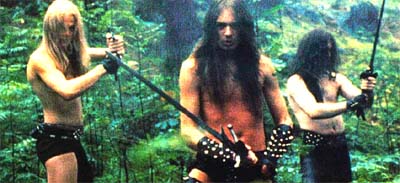
I have personally never allowed for any personal ideologies to influence my music or lyrics. For some years German metal media would say BATHORY was glorifying war and the holocaust in the lyrics. This is not true. We were writing about war and the holocaust in the very same way we were writing about all the other things we have written about; incest, the nuclear arms race, the world wars, the environmental issue, female BATHORY fans, serial killers, religion and fuck knows what else. In other words, as facts, not glorifying. I am not religious and have no political ideals, so for myself personally, writing lyrics is just painting with words and creating a scene.
Black metal today has gone through a shaping process of which Bathory was part. What do you think are Bathory’s contributions to the methodology of metal making?
I have absolutely no idea about what’s going on out there. I am not going to shows, I do not read the metal media and I do not buy or listen to any modern metal albums of any kind. If you’d play me ten tracks by ten different top extreme metal acts I couldn’t tell you what you’re playing. I wouldn’t be able to tell you where even one out of a hundred extreme metal bands comes from. People seem to believe that I have great knowledge and full view of the scene. I tell you, I know nothing. Nothing. Period.
The funny thing is, a lot of people insist that BATHORY’s so called Viking period had a greater impact on today’s Black Metal scene, than pure Black Metal of the early 80’s. The good thing about evolution is that what’s called Black Metal today, may not remind too much of what Black Metal was 20 years ago. Black Metal, Death Metal and all types of extreme metal, will develop further. The ones who get the most out of a diverse scene and constant evolution, is the audience.
As far as BATHORY’s contribution is concerned, back in 1986-1991 we used acoustic guitars, harmony backing vocals, intros and outros as well as sound effects to create that specific BATHORY atmosphere. Many bands have been copying that so thoroughly in the past 10-15 years, I believe this special atmosphere itself could perhaps be our greatest contribution.
From what I heard of your solo work (band named “Quorthon”) it seemed you were moving into a genre where you could use the broad style of rock music to fit in a number of melodic but hookish pop songs. Is this a return to your influences, or a changing of taste?
It’s funny that some people actually believe that the solo records is what I really want to do and that I only kept on working with BATHORY because it would sell like crazy. This is not true. I have written everything from extreme brutal metal to string quartets, and neither of the solo albums I did gives a more true image of what my inner music is like than anything else I have written.
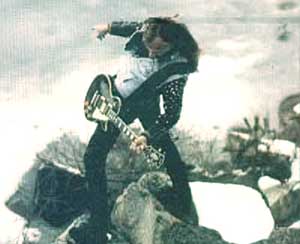
Everything on the first solo album was accidental. I had absolutely no ambitions or plans. What happened was, I said I wanted to take a year off from music. Then the record company told me that I perhaps should think about a solo record, just to keep myself active. Now, that’s a very interesting situation. Not too many guys get to make a solo record. Myself, I had no idea what it would sound like. The offer to make a solo album was a challenge too exciting to ignore. So I wrote some pure guitar based crunchy metal rock material and went down a small studio for a week and a half. I brought with me a guitar, a bass and a drum machine with only one intention and that was to make a record that wasn’t going to be anything like BATHORY. Not that I didn’t like working with BATHORY, I just thought it was a good opportunity to “kill” the very erroneous image of “Quorthon” which had developed in fanzines and within the metal scene in general. People thought I was a neo-nazi satanic Viking who drank blood and ate infants, who lived in a bats cave in the north of Sweden and tons of other stupid things. I figured, if I produced a solo album that was miles from BATHORY, incorporating a little rock, blues and even punk, perhaps the most fanatic nut cases would be scared off.
The second solo album came about because people wrote me and said they were now very interested to see what I would come up with on a second solo record. So I wrote a lot of material, mixing The Beatles, Sex Pistols and Mountain plus punk. I have no plans for a third solo record, but having said that, I might just as well record a third solo album in future if I feel like it.
When you see bands today making black metal in the style of the nordic generation after 1987 (inspired by your Blood, Fire, Death and Sarcofago’s INRI in my supposition) what do you see as the possible future directions for that style of music?
Like I said previously, I do not think in terms of “genuine” or “true” metal versus “not-so-genuine” or “untrue” metal. My philosophy is; the more versatile and innovative a scene is, the more the audience will get out of it. It would be a very poor testimony if a scene were to contain only one style of music played exactly the same way, with the very same type of lyrics and image and so on. I think it’s more “posing” to be copying a certain style of clothing, wear make-up and use the exact same production as tons of other acts simply because it is the flavour of the day.
As far as the future of extreme metal is concerned, I do not worry at all. I know there will be tons of great bands in the future as well. The scene will be forever. There will be new names, new styles and new topics. The dark, evil and demonic will always be a part of the scene. The mythological themes will be there as well. I agree it would be interesting to see what else will happen as far as topics are concerned.
Do you think the world is on the edge of great change? If so what will change, and what is forcing it to change (what needs to change)?
I really don’t bother about the world or society at all. I’ll be dead in 30-40 years and neither people, politics, religion or society interests me at all.
Is the metal underground an effective way of distributing niche music according to its artistic integrity, or a justification for the kind of independent distribution needed to move relatively small numbers of CDs?
There’s more than one way to look at the underground distribution; firstly it will allow for acts to target the very type of audience they’re targeting specifically. Secondly, people interested in a specific type of music will be able to easily get a hold of very special CD’s and vinyl through underground distribution network.
Let’s face it, some extreme metal productions will never reach sales figures around 10 000-20 000 copies. A lot of acts will be happy to sell 5 000 or even 3 000 copies. With such a small quantity of CD’s sold, few record companies, even pure metal companies will even touch certain bands. The underground will be able to distribute albums made during less expensive circumstances, albums that still will have a lot to offer in terms of interesting arrangements etc. So in that respect, I think that the underground is doing a pretty tremendous job.
But the underground is also exploited by pirates, assholes, haemorrhoids and parasites. There are more illegal BATHORY CD’s circulating in the underground than genuine official BATHORY albums released. There’s fake “BATHORY live albums” out there, I have heard of “Quorthon rehearsal” cassettes and “lost recordings” on CD, and this absurd list just goes on and on. I will occasionally email these mailorder companies and underground metal shops, and tell them that they are distributing BATHORY fakes and illegal crap. Also, I will tell them that not only are they violating international laws of copyright and publishing rights, they allow the bootlegging pirates and haemorrhoids to use their network for criminal purposes. That’s not underground, that’s theft and breach of trademark laws etc.
I have heard of some really awful quality bootleg BATHORY CD’s and feel sorry for the fans that buy them for 15-25 dollars. All they get is crap quality copies of tracks released on our Jubileum volumes. The fans could easily just get the genuine thing from us directly. I came from the underground and I hurt like hell when I hear how young fans are being exploited this way. Any underground shop or mailorder dealer who will help in distributing bootleg crap is killing the underground.
Do you have any spiritual beliefs, or strong ideological concerns?
Nope, not a glimpse of spirit in me at all.
It seems to me that most metal musicians start their lives more antagonistic to society as a whole, and eventually as they age begin to acknowledge the need for a society but a dissatisfaction with its design. Do you have any comments here as general observations?
I am sure a lot of people will mature with age and realise down the road the need for a functioning society. But that probably has less to do with social awareness or a philanthropic pathos. It will have a lot more to do with the fact they’re beginning to pay taxes and want to see some results for their money paid.
How do you compose a song and, how integral are the lyrics?
I will just strike a guitar riff and continue from there. If it sounds good enough to work on further, I’ll write a song in an hour or so. A day, a week or a month later I may listen back to it and just taste a few words and see what comes out of it all. I rarely plan before writing a song what it should be about. All that will come along the process. I’ll say it again, I think the music and lyrics writes itself. I’m just a tool used by the demons of music.
Is Twilight of the Gods a rock opera in the style of the who, progressive bands from the 70s, etc?
I don’t know where that rock opera thing came from. I guess people had no idea what to call that kind of heavy bombastic arrangements 10 years ago. It wasn’t Black or Death Metal, so some people felt compelled to come up with some label for it. But to call it a rock opera is laughable. “Twilight” is no mot a theme album in any way, no track two off “Twilight of the Gods” has got anything to do with eachother, they are all individual tracks with totally different stories.
“Requeim” is more a theme album than “Twilight”, because it contains with the subject of death in all forms may it be suicide, murder, culture death, genocide or death in war or by cult.
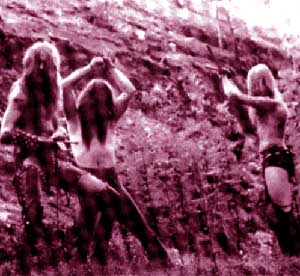
How do you unwind/relax, or, what do you do for recreational purposes? (what do you enjoy besides music)
I’ll read a book or stride my Harley-Davidson motorcycles and go for a ride. I used to build a lot of plastic models, paint a lot or collect war memorabilia in the past but not as much these days.
Is it possible to return to metal with a different style after one has become one of the founding names of a certain style?
Depends what you mean by “return to metal”. I am the same metal underground shit kid today that I was 20 years ago. I’m still playing as brutal a guitar as I have been for 20 years. So it can’t be that I’ve been all of a sudden sliding back into a metal slot for some reason. It’s not like I have been travelling the world with a can-can orchestra since last time around.
I can’t see what a “return to metal” should point to. If there’s no BATHORY album out for a period of 5 years (as was the case between “Blood on Ice” and “Destroyer of Worlds”), some will call that a comeback. That’s absurd. Just because you’re not in people’s face all the time, it’s not a come back to have a new album out even if it’s more than a year between it and the last release.
People are so stuck with labelling acts and individuals, calling things and circumstances by so many names and whats more just to make life easier for themselves to live, it makes me sick.
The Odin mythos present in Blood on Ice, Blood, Fire, Death, and Twilight of the Gods seems to derive inspiration from the Nietzschean/Jungian view of the human psyche and the culmination of some of its historical inabilities. Do you think these ideas are gaining prevalence at this time, or becoming more obscure as society degenerates?
“Blood on Ice” was a saga based loosely on the Siegfried legend and an original story by Robert E Howard. The “Blood Fire Death” album really has nothing to do with Vikings at all except for the title of the track “Oden’s ride over Nordland”. But that’s not really the issue. It’s not important if an album or a track is or is not about this or that shit. The important thing is if it gives you the kick inside.
I think people see and hear more things then I really meant to put on them albums. The “Blood Fire Death”, “Hammerheart” and “Twilight” albums has been linked together as the “viking-albums”, the same way the first three albums “Bathory”, The Return” and “Under the Sign” has been tied into a trio. I gave up years ago trying to talk people out of all that crap. It’s just atmospheric metal, I don’t really bother much about the depth or context etc.
I really don’t remember why I picked some stuff up from Nietzche 10 years ago, I wasn’t reading much by him. It may have been through Wagner. I think cults, theories and views of all sorts will exist in much the same way for as long as there are people around.
Please insert any commentary on the questions, issues addressed, things missed in the interview, or general concluding remarks you may have.
We’re just right now finishing a 14-15 track new album to be released in September/October this year. Look forward to it and take care.
Hail the hordes !
Quorthon
In a sequence of words, i.e. by a chain of symbols, something new and greater is to be represented: rhythm, dynamics and harmony again become necessary on this level of expression. This higher sphere now governs the more limited sphere of the individual word; it becomes necessary to select words, to put them in a new order; poetry begins. The spoken melody of a sentence is not just the sequence of the sounds of the words; for a word has only a quite relative sound, because its character, the content presented by the symbol, varies according to its position. In other words: the individual symbol of the word is constantly being re-defined by the higher unity of the sentence and the character this symbolizes. A chain of concepts is a thought; in other words, this is the higher unity of the accompanying representations. The essence of the thing is inacessible to thought; the fact that it has an effect on us as a motive, as a stimulant of the will, can be explained by the fact that the thought has already become a remembered symbol for a manifestation of the will, for a movement and a phenomenon of the will in one. But when it is spoken, i.e. with the symbolism of sound, its effect is incomparably more powerful and direct. When it is sung, when melody is the intelligible symbol of its will, it reaches the summit of its effect; if this is not the case, it is the sequence of sounds which affects us, and the sequence of words, the thought, remains something distant and indifferent.
– F.W. Nietzsche, The Birth of Tragedy
Thanks to Black Mark Records.
No CommentsTags: Bathory, interview, quorthon
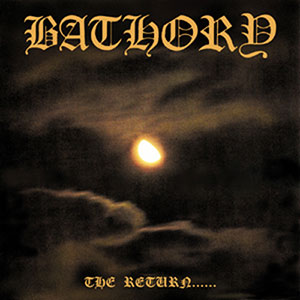 Bathory’s relation to the band’s fanbase is an infected story of contradictory interests concerning very human desires for truth and meaning. Oftentimes fans and creator pulled in opposite directions, fighting over whether to leave the Bathory mask on or reveal Bathory’s inner workings.
Bathory’s relation to the band’s fanbase is an infected story of contradictory interests concerning very human desires for truth and meaning. Oftentimes fans and creator pulled in opposite directions, fighting over whether to leave the Bathory mask on or reveal Bathory’s inner workings.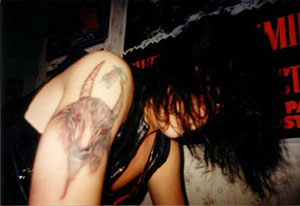 Ironically, many fans have as of recently noted that Quorthon himself tampered with the truth quite deliberately. The iconic Bathory goat – which has become a sort of identity marker among fans – is, according to Quorthon, a collage created out of bits and pieces “from several horror comic magazines”. In fact, the goat is taken from a finished illustration in a book on witches from 1981. It wasn’t until 2007 that the originator, Joseph A. Smith, got to know that his drawings had been used as subject matter for tattoos and the like all around the world for decades. It also turns out that the lyrics and title to Bathory’s “For All Those Who Died” is more or less stolen from a feminist poem by Erica Jong.
Ironically, many fans have as of recently noted that Quorthon himself tampered with the truth quite deliberately. The iconic Bathory goat – which has become a sort of identity marker among fans – is, according to Quorthon, a collage created out of bits and pieces “from several horror comic magazines”. In fact, the goat is taken from a finished illustration in a book on witches from 1981. It wasn’t until 2007 that the originator, Joseph A. Smith, got to know that his drawings had been used as subject matter for tattoos and the like all around the world for decades. It also turns out that the lyrics and title to Bathory’s “For All Those Who Died” is more or less stolen from a feminist poem by Erica Jong.




